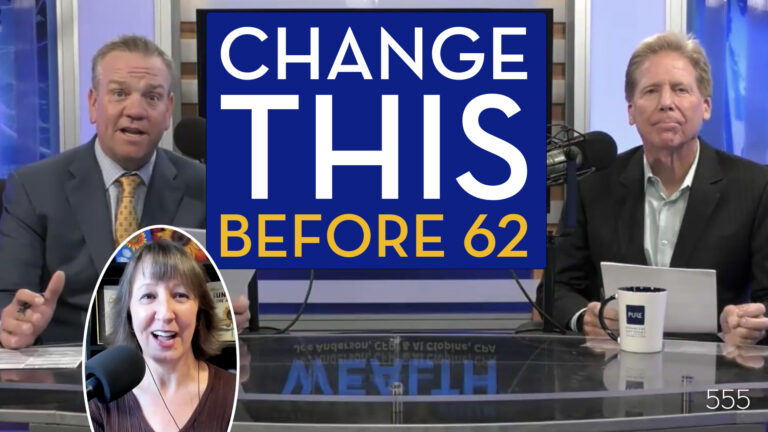Joe Anderson, CFP® and Big Al Clopine, CPA discuss the good, the bad and the ugly of baby boomers’ retirement plans in episode 64 of the YMYW podcast. Plus, Big Al quizzes Joe on retirement and investing questions. Original publish date September 10, 2016 (hour 2). Note that content may be outdated as rules and regulations have changed.
00:00 – Intro
03:30 – “There is talk about how to fix Social Security. I personally think what they’ll do is they’ll raise retirement age; they may raise the rates, or the amount we put in Social Security…”
08:49 – “How will you make your money work for you while reducing your risk? How will you avoid the retirement tax trap that we’ve been talking about that could cost you thousands of needless taxes?”
16:10 – “There are ways that you can increase your possibility of working longer; one is staying healthy, one is performing well at your current job…going back to school and learning new skills.”
18:07 – “As you near retirement, tax planning becomes more important than ever, but you must use a forward-looking tax strategy.”
21:42 – “True or false? If you take your Social Security benefit early, you’ll lock in reduced monthly payments for life.”
24:08 – “At what age do you qualify for the maximum Social Security retirement benefit? 68, 70 or 72? If you wait until age 70 you get the maximum benefit.”
30:22 – “How do I avoid filing a trust return every year?”
33:27 – “I am a non- U.S. citizen living outside the U.S. and trading stocks through a U.S. internet broker. Do I have to pay taxes on the money I earn?
34:22 – “How do Roth IRAs gain interest?”
Listen to the YMYW podcast:

Amazon Music
AntennaPod
Anytime Player
Apple Podcasts
Audible
Castbox
Castro
Curiocaster
Fountain
Goodpods
iHeartRadio
iVoox
Luminary
Overcast
Player FM
Pocket Casts
Podbean
Podcast Addict
Podcast Index
Podcast Guru
Podcast Republic
Podchaser
Podfriend
PodHero
podStation
Podverse
Podvine
Radio Public
Rephonic
Sonnet
Spotify
Subscribe on Android
Subscribe by Email
RSS feed

YouTube Music
IMPORTANT DISCLOSURES:
Pure Financial Advisors is a registered investment advisor. This show does not intend to provide personalized investment advice through this broadcast and does not represent that the securities or services discussed are suitable for any investor. Investors are advised not to rely on any information contained in the broadcast in the process of making a full and informed investment decision.
• Investment Advisory and Financial Planning Services are offered through Pure Financial Advisors, LLC, a Registered Investment Advisor.
• Pure Financial Advisors LLC does not offer tax or legal advice. Consult with your tax advisor or attorney regarding specific situations.
• Opinions expressed are not intended as investment advice or to predict future performance.
• Past performance does not guarantee future results.
• Investing involves risk including the potential loss of principal. No investment strategy can guarantee a profit or protect against loss in periods of declining values.
• All information is believed to be from reliable sources; however, we make no representation as to its completeness or accuracy. As rules and regulations change, content may become outdated.
• Intended for educational purposes only and are not intended as individualized advice or a guarantee that you will achieve a desired result. Before implementing any strategies discussed you should consult your tax and financial advisors.
CFP® – The CERTIFIED FINANCIAL PLANNER™ certification is by the Certified Financial Planner Board of Standards, Inc. To attain the right to use the CFP® designation, an individual must satisfactorily fulfill education, experience and ethics requirements as well as pass a comprehensive exam. Thirty hours of continuing education is required every two years to maintain the designation.
AIF® – Accredited Investment Fiduciary designation is administered by the Center for Fiduciary Studies fi360. To receive the AIF Designation, an individual must meet prerequisite criteria, complete a training program, and pass a comprehensive examination. Six hours of continuing education is required annually to maintain the designation.
CPA – Certified Public Accountant is a license set by the American Institute of Certified Public Accountants and administered by the National Association of State Boards of Accountancy. Eligibility to sit for the Uniform CPA Exam is determined by individual State Boards of Accountancy. Typically, the requirement is a U.S. bachelor’s degree which includes a minimum number of qualifying credit hours in accounting and business administration with an additional one-year study. All CPA candidates must pass the Uniform CPA Examination to qualify for a CPA certificate and license (i.e., permit to practice) to practice public accounting. CPAs are required to take continuing education courses to renew their license, and most states require CPAs to complete an ethics course during every renewal period.









